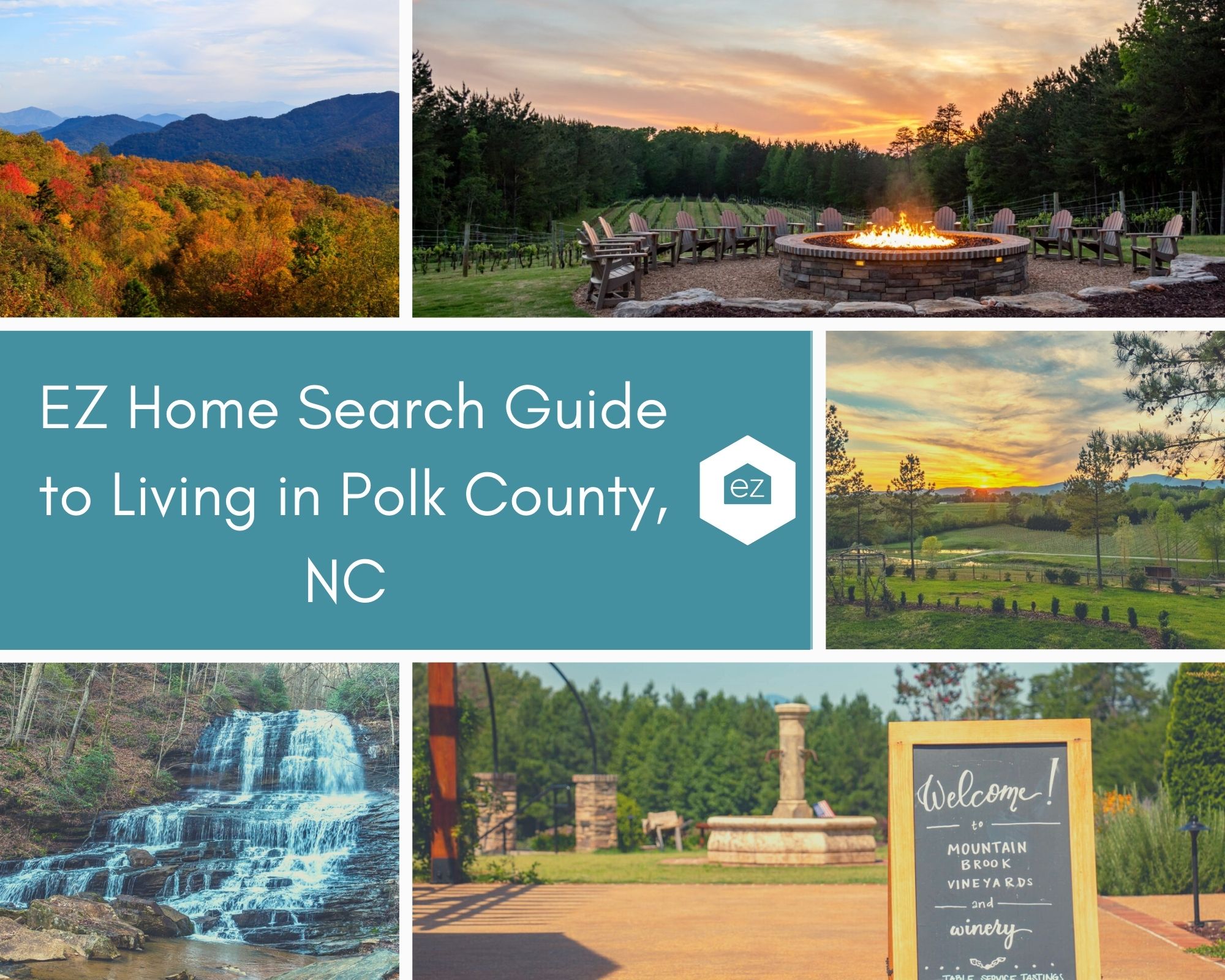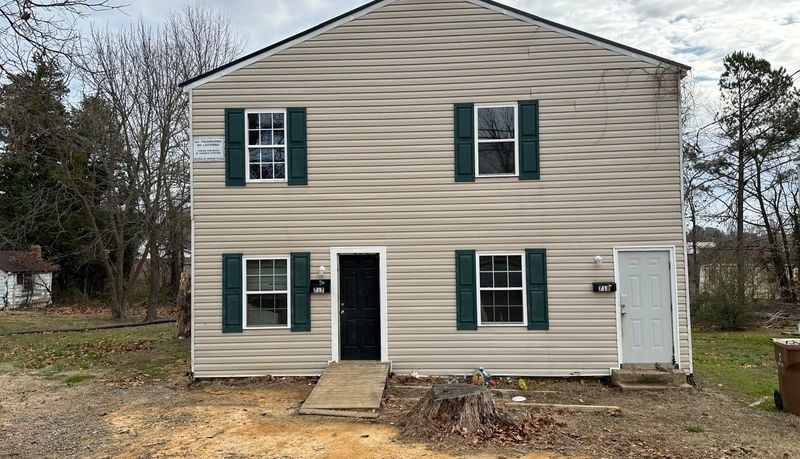EZ Home Search Guide to Living in Polk County, NC
EZ Home Search Guild to Living in Polk County, NC
Are you seeking a mountain lifestyle with scenic views and lots of social activities? Polk County, North Carolina, is a mountain destination with a calendar full of events, a community-based lifestyle, and a renowned center for horsemanship. While it isn’t as developed as some mountain counties, residents still have lots of things to do and enjoy without hordes of tourists.
Check out life at the edge of the Blue Ridge Mountains and the Piedmont range. Our Polk County Community profile provides an overview of living in North Carolina’s foothills.
About Polk County
Polk County is a rural mountain community of rolling farmland and long-range views of the Blue Ridge Mountains. It isn’t far from more urbanized regions. Asheville is about 45 miles away, and Charlotte, NC is 90 miles away. The South Carolina capital Columbia is 120 miles. When residents need to visit a metropolitan destination, they have access to transportation networks, airports, and greater urban amenities.
Rutherford County borders Polk County to the northeast, Henderson County to the west, and the South Carolina counties of Spartanburg and Greenville to the South.
The land divides into two distinct geographic regions. The western third of the county is the Blue Ridge Mountains. The remaining two-thirds are part of the Piedmont Region, a series of scenic rolling hills. Polk County is a transition zone for western North Carolina. The total elevation ranges from just under 800 feet at the confluence of the Green River and the Broad River to 3200 feet on Tryon Peak.
Various rivers and creeks wind their way through Polk County. A dam at the Green River creates the county’s largest body of water, Lake Adger. The lake is about five miles north of Columbus.
Residents enjoy a mild climate. Winter temperatures average 53F degrees for the high and 31F degrees for the low. In July, temperatures average 88F degrees and 66F degrees. Both of these months typically see around five inches of precipitation. Snow happens, but it is rare. It’s more likely to occur on the Blue Ridge Mountain peaks.
The cost of living in Polk County is more affordable than the United States average. The Best Places index sets the United States average at 100. Polk County overall had a 94.5 cost of living measurement. Residents paid more for health care, indexed at 115.4, but the least for transportation, coming in at 76.5.
The majority of highways and roads are rural networks. Polk County does have Interstate 26 running from the southwest to the east before it turns south near Columbus.
Polk County History
Before European settlers discovered Polk County, the Cherokee tribe lived here and built substantial log houses. Hernando de Soto documented their lifestyle and that they were accomplished hunters and farmers.
European settlers were drawn into the area for the same reasons that Cherokee set up home here. By 1768, traders were traveling through Polk County down to Charlestown to bargain their wares and furs. The influx of trappers and settlers created conflict with the Native American peoples. The skirmishes were so common and of note that Royal Governor William Tryon journeyed to parley with the Cherokee peoples and negotiate a boundary line. The settlers were so happy with his negotiations that they named the highest place on White Oak Mountain Tryon Peak.
The boundary did not ensure the safety of the pioneers, and many raids and skirmishes continued until the native people were driven out. As European settlement increased, the area became a stopping point for drovers moving livestock from Kentucky and Tennessee to the coastal harbors.
Through its early years, Polk County remained primarily agricultural. It was not formed as a county until 1855 when it was created from Rutherford and Henderson counties. Its name comes from a colonel in the American Revolution war, Lt. Colonel William Polk. The county seat was named after Dr. Columbus Mills of Mill Spring, whose ancestor was a Loyalist hanged by Patriots after his capture at the Battle of Kings Mountain.
Different parts of the county have drawn people to form settlements. Tryon became an equestrian hub, surrounded by hunting country and rolling countryside ideal for riding trails. Tryon has attracted writers, artists, professionals, and executives who appreciate its community lifestyle. Saluda became famous as a vacation area for Lowcountry people escaping hot summers. It’s also noted for its apple orchards.
Polk County Cities and Areas
Columbus is the county seat. The one-block downtown and park act as a hub for county events. The restored historic courthouse is one of the oldest still in use. Find many antique shops, local businesses, and restaurants around the downtown area. New shops and conveniences are found near I-26.
Tryon is the largest town, but it only has a population of around 2,000 people. Shaped in a circle, it grew as a resort town through the 1800s. People came for the mountain views and the great climate. Artists, writers, and crafters visited or moved to Tryon, creating a vibrant culture. Many of its buildings are on the National Register of Historic Places. Today, Tryon is best known as an equestrian center. It began in the 1940s with the Tryon Riding & Hunt Club and the Blockhouse Steeplechase. Today, there are year-round horse shows at the Foothills Equestrian Nature Center and Tryon International Equestrian Center.
Saluda is a small town on the border. Despite its size, it has a good selection of restaurants, retailers, and cultural venues. Many homes were built as summer residences for tourists from South Carolina. Most of the Main Street buildings are on the National Register of Historic Places.
Mill Spring is a launching point for some of the best views in the county. Enjoy scenic drives through the winding hills. Mill Spring is the closest town to the Tryon International Equestrian Center, which has a competition venue, restaurants, and lodging.
Polk County Job Market
Polk County’s leading industries for employment include health care and social assistance, retail trades, accommodation and food service, and educational services. Based on the number of employees, the region’s top employers include Polk County Public Schools, Acts, Incorporated, Polk County Government, St Luke’s Hospital, Tryon International Equestrian Center, White Oak Management, Pure Country, and Autumn Corporation.
As of July 2021, the unemployment rate stood at 4.5%. It was in line with the reported North Carolina rate of 4.6%.
Polk County Real Estate Market
The Polk County real estate market saw no change in the number of new listings year-over-year (YOY) from August 2020 to August 2021. Year-to-date, new listings were up 20%.
The median sales price of a Polk County home was $415,000, a 37% YOY increase. There is buyer demand, as evidenced in the days on the market until sale, which dropped 42% to 36 days. Polk County had a 2.1-month supply of inventory in August 2021.
Looking at Polk County real estate trends, after a slight leveling-off in 2019, median sales prices rose through 2020 and 2021.
EZ Home Search will have the latest information on Polk County real estate. Our database updates every 15 minutes with the most current listings.
The county property tax rate for the fiscal year 2021- 2022 was $0.5143 per $100 assessed value. It was one of the lowest tax rates in North Carolina. The town of Tryon had a rate of $0.4810 of $100 assessed value in 2020-2021.
Polk County Demographics
As of the 2020 US Census, Polk County had 19,328 residents. Its population base declined since the last census in 2010, losing 1,396 residents. The projection had been for a 1% growth rate. The population was 92% rural.
Of its residents, 32% were aged 65 and over. Around 16% were under the age of 18. The median age for a Polk County resident was 53. Residents primarily identified as white alone, representing 88% of the population. Approximately 6% identified as Hispanic or Latino and 4% identified as African American.
The average median household income was $48,787. Around 30% of residents aged 25 and older said they had obtained a bachelor’s degree or higher, and 91% had obtained a high school degree or higher.
Polk County Education
Polk County Schools provides public education for grades pre-K to 12 to around 2,300 students. While it is a small school district, its schools have been recognized for a student-centered focus. The county operates four elementary schools with an emphasis on community-centered education with preschools for the youngest learners. The students merge under one middle school before choosing between the two high schools, one being an early college high school.
One private school operates inside Polk County, the religiously affiliated Seventh-Day Adventist.
Higher education is available at Isothermal Community College, a two-year school that provides over 100 associate’s degrees, diplomas, and certificates for students in Rutherford and Polk counties. The college has three locations and has alternative short-term, non-degree programs in healthcare, hospitality, emergency services, and more.
Polk County Health Care
The primary health care provider is St Luke’s Hospital in Columbus. It is the only critical access hospital in a 200-mile radius. It has earned a five-star distinction for patient experience, one of only 266 hospitals in the nation to earn the rating. Its services include emergency care, general surgery, primary care, pain management radiology, cancer care, and rehabilitation. It has affiliations with trauma centers in Asheville, Greenville, and Spartanburg. It also has off-site providers such as the Foothills Medical Association and Saluda Family Medicine.
Low-cost health care options are available through the Polk County Health Department. The department offers women and children’s nutrition, immunizations, radiology, and cancer care.
Polk County Things To Do
One of the first things that come to mind to do in Polk County is equestrian activities. Polk County has miles of horseback riding trails and training centers for those looking to work on their equine skills.
Since historically the county attracted creative people, historic Tryon and other towns are centers for the arts. Many art galleries are available to visit and find unique creations.
For those that enjoy adventurous outdoor sports, the Green River offers white water rapids from class I-III. Class IV rapids are available for advanced paddlers. You can choose between a float trip or a high adventure outing. Tubing is also available on the Saluda River.
The Pacolet River Scenic Byway Drive is a ten-mile byway following this river from Tryon to historic Saluda. Along the way, admire the beautiful views, waterfalls, and wildflowers when in season.
If you prefer to see the views on foot, try one of the available hiking trails. Pearson’s Falls and Glen attracts over 20,000 visitors a year. The quarter-mile hike leads to a 90-foot waterfall. The Green River Game Lands trails are more rugged and wander across its 10,000 acres of forest.
The Saluda, Green, and Pacolet Rivers run through its borders. These are supported by other creeks and streams popular for fly fishing. Hatchery-supported trout waters are available from March to August, with a limit of seven trout a day.
The Tryon International Equestrian Horse Center attracts people from March to November for its frequent horse shows. The Blockhouse Steeplechase takes place in the spring and is one of the largest steeplechase events in the country.
Visitors come for the Saluda Arts Fest in May and the Green Creek Spring Arts and Flowers Festival. In September, there’s the Art Track Foothills Open Studio Tour where the various studios open their doors to visitors. In October, bring your bicycle for the Tour De Leaves bicycle tour.
Polk County Local Attractions
Tryon International Equestrian Center (TIEC) is the region’s most well-known attraction. This international hub of equestrian athletes welcomes guests throughout the year to watch, dine, shop, and enjoy a premier riding facility. Riders from all over the United States in the world compete at the TIEC in different equine events. Spectators enjoy elevated viewing areas around the ring, ample shade and seating, and facility amenities like delicious restaurants. During non-competition weeks, the center hosts festivals and concerts.
Foothills Equestrian Nature Center is a 390-acre Nature Preserve with hiking and horseback riding trails. The facilities also include a picnic area and a boardwalk. A nine-hole disc golf facility is behind the main building.
The Green River House is a restored 19th century 42-room mansion listed on the National Register of Historic Places. Built-in 1804, it was part of the historic events of Stoneman’s Raid in 1865. Today it is a venue for various events.
Polk County History Museum has a collection of artifacts telling the story of the county. Among the exhibits are an early 1800s stagecoach, antique farm tools, a school display, a replica of a doctor’s office, and information on other points of interest, such as the Dough Boy Statue, a World War I memorial in downtown Columbus.
In the heart of downtown Columbus, Stearns Park has breathtaking views of the mountains and the historic Polk County Courthouse. This is the center of some of the county’s best-known celebrations, like Columbus’s Fabulous Fourth. Other festivities held here include the town Easter Egg Hunts, Halloween Carnival, and A Christmas Carol.
Morris the Horse is a beloved landmark at the corner of Trade and Pacolet Streets in Tryon. He has stood in place since 1928 and symbolizes the era when wooden toy horses just like him were manufactured in Tryon and shipped around the country. The current rendition is fiberglass and does not move around the county like some of the originals did.
The Saluda Historic Depot at the crest of the small mountain village was built in 1903 and is on the National Register of Historic Places. The railroad that led to it was the steepest mainline standard gauge railroad in the country. Today it has memorabilia related to the Saluda grade.
Polk County Dining
Residents of Polk County appreciate the many family-owned and local dining venues. These restaurants make use of the agricultural bounty found in the area. Great service is a must in these locations, and the wait staff here get to know your name. Some of the local favorites include:
- Thompson’s Store in downtown Saluda is the oldest grocery store in North Carolina. In addition to serving gourmet goods, Ward’s Grill next door is where locals go for breakfast and lunchtime in an authentic 1950-style setting.
- Atkins Orchards is the place to pick up homemade ciders made from apple, cherry, muscadine, and peach. They also produce a variety of jams, pickles, and butters.
- Newman’s Restaurant at Orchard Inn is a farm-to-table fine dining experience with beautiful mountain views. It is outside Saluda and was voted the number one restaurant in Western North Carolina by OpenTable.
- Cafe La Gaule brings a slice of French elegance to this breakfast and lunch place.
- Caro-Mi Dining Room is by the Pacolet River is a rustic country eatery serving upscale meals since the 1950s. Try the Tar Heel pie.
- Green River BBQ in Saluda has a reputation for being some of the best barbecue in Western North Carolina.
- Roger’s Diner at TIEC is a 50’s inspired diner serving food seven days a week.
- The Rural Seed serves all three meals a day using locally sourced products.
Polk County also has four vineyards that make use of the fertile soil found in the Foothills region;
- Overmountain Vineyards has been growing grapes since 2010. Enjoy a taste as you soak in the mountain views from their porch.
- Mountain Brook Vineyards has award-winning wines.
- Parker-Binns Vineyard has 35 Acres in the foothills of the Blue Ridge Mountains.
- Iron Key Brewing once was a state prison, but today is a craft brewer.
Polk County Shopping
Downtown Columbus has a one-block area with antique shops, local businesses, and restaurants. This is the place to shop local.
Thompson’s Store in downtown Saluda has been the place to go since 1890 for residents. It has a full-service meat market, a deli section, fine wines, fresh produce, household staples, and gift items.
Historic downtown Saluda is a place where you’ll discover antiques and vintage goods. Connect through the Pacolet River Scenic byway to the Tryon Antique Mall.
Living in Polk County
For the horse lover, Polk County is a great place to put down residence. Even if you are not a horse person, Polk County still has much to offer. This rural county has an affordable cost of living, access to excellent health care, and a community-based school system. Many of the stores and restaurants here have been in operation for decades, if not centuries. With under 20,000 residents, this is a place where the locals support each other. A nurturing community is at the heart of what life is like in Polk County.
Start Your Home Search
Preston Guyton
Share this Post
Related Articles
Living In
Your EZ Guide to Living In Salisbury, MD
Living In






